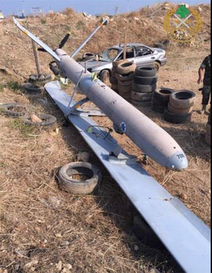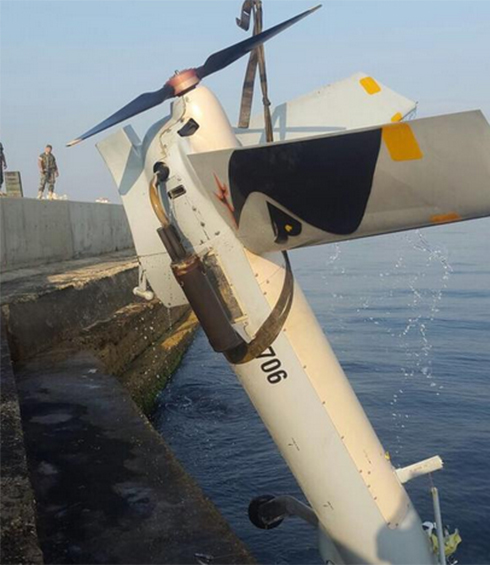20 dec 2015
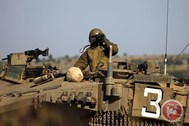
A picture taken from the Israeli-annexed Golan Heights shows an Israeli soldier monitoring the Syrian Druze village of Hader.
Sirens sounded Sunday before three rockets landed in open areas in northern Israel, Israel’s army said.
The Israeli army said that forces were searching the area following the attack. No damage or injuries were reported.
According to Israeli media, the Israeli military responded with artillery fire into Lebanon, despite no group having claimed the rocket attacks.
Sunday’s rocket attack comes one day after reports of an Israeli airstrike in Syria's capital of Damascus which reportedly killed top a Hezbollah official, Samir Kuntar, as well as several Syrian civilians, according to international media reports.
Kuntar, born in Lebanon to a Druze family, joined the militant group Palestinian Liberation Front at a young age and was detained in Israel for decades after involvement in an attack in 1979 that left four Israelis dead.
Kuntar and other prisoners were later released in a prisoner swap for the bodies of two Israeli bodies held by Hezbollah, a controversial move among the Israeli populace due to the reported brutality of Kuntar’s 1979 attack.
Kuntar joined Hezbollah following his release, and was believed to be recently involved in militant activity in the Israeli-occupied Golan Heights, where a significant number of Syrian Druze live.
Since the Syrian conflict erupted in 2011, the Golan has been tense, with a growing number of rockets and mortar rounds hitting the Israeli side, mostly stray, prompting occasional armed responses.
Israel has avoided large-scale involvement in the conflict in neighboring Syria, but opposes Bashar Assad’s regime and has reportedly carried out strikes on Iranian arms transfers to Hezbollah through Syria.
Sirens sounded Sunday before three rockets landed in open areas in northern Israel, Israel’s army said.
The Israeli army said that forces were searching the area following the attack. No damage or injuries were reported.
According to Israeli media, the Israeli military responded with artillery fire into Lebanon, despite no group having claimed the rocket attacks.
Sunday’s rocket attack comes one day after reports of an Israeli airstrike in Syria's capital of Damascus which reportedly killed top a Hezbollah official, Samir Kuntar, as well as several Syrian civilians, according to international media reports.
Kuntar, born in Lebanon to a Druze family, joined the militant group Palestinian Liberation Front at a young age and was detained in Israel for decades after involvement in an attack in 1979 that left four Israelis dead.
Kuntar and other prisoners were later released in a prisoner swap for the bodies of two Israeli bodies held by Hezbollah, a controversial move among the Israeli populace due to the reported brutality of Kuntar’s 1979 attack.
Kuntar joined Hezbollah following his release, and was believed to be recently involved in militant activity in the Israeli-occupied Golan Heights, where a significant number of Syrian Druze live.
Since the Syrian conflict erupted in 2011, the Golan has been tense, with a growing number of rockets and mortar rounds hitting the Israeli side, mostly stray, prompting occasional armed responses.
Israel has avoided large-scale involvement in the conflict in neighboring Syria, but opposes Bashar Assad’s regime and has reportedly carried out strikes on Iranian arms transfers to Hezbollah through Syria.
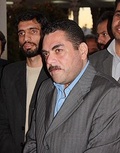
Samir al-Kuntar
The Israeli Air Force assassinated, on Saturday at night, the former political prisoner and senior Hezbollah leader, Samir al-Kuntar, in an air strike in the Jermana area of the Syrian capital Damascus.
The Hezbollah party in Lebanon said the Israeli Air Force violated Syrian air space at around 10:30 at night, and fired five missiles into a residential building, killing six people, including al-Kuntar, and wounding at least twelve others.
The Civil Defense Forces in Jermana said two Israeli war jets violated Syrian airspace and struck the building with four missiles.
Initial reports were first unconfirmed, but his brother later announced on his Twitter account the confirmed dead of al-Kuntar.
Samir al-Kuntar spent 29 years in Israeli prisons, and was released on July 16 2008, under a prisoner-swap agreement reached through negotiation between Hezbollah and the Israeli government through a third party.
As part of the agreement, Israel released al-Kuntar and four other Hezbollah members, who were taken prisoner during the July 2006 war between Hezbollah and Israel, in which Israeli troops invaded and bombed Southern Lebanon, and Hezbollah fired rockets across the border into Israel.
Hezbollah is the leading party in southern Lebanon, and has a fighting force that works to deflect further Israeli invasions into Lebanon.
The 2008 agreement also included the transfer of the remains of 199 fighters, including Palestinian and Lebanese fighters, in exchange for Hezbollah releasing the remains of Israeli soldiers killed during the war.
Retired Israeli major general and current Member of Knesset (Parliament) with the Zionist Union party, Major. Gen. Eyal Ben-Reuven, hailed the reports of the assassination, and said that the Air Force and all others involved in the incident “should be commended for the successful operation.”
Ben-Reuven, the former head of the Northern Command on the Israeli army, said the Israeli government is preparing for retaliatory attacks by Hezbollah.
Israel held al-Kuntar responsible for the April 22nd 1979 attack that led to the death of four Israelis: a police officer, an Israeli civilian and his 4-year-old daughter, while the man’s other daughter, 2, was accidentally suffocated by her mother, while trying to keep her quiet. The attackers allegedly kidnapped the family in Nahariya and took them to a beach, then tried to load their hostages on a rubber boat.
Israeli police decided to attack with full force instead of attempting to negotiate, and the father of the family and a police officer were killed. The 4-year old was killed when her head hit a rock during the scuffle. Two fighters, identified as Abdul-Majid Aslan and Moayyad Mhanna, were killed, while al-Kuntar and Ahmad al-Abrass were captured. Al-Abrass was later released, along with 1150 detainees, in a prisoner swap agreement, led by the Popular Front for the Liberation of Palestine – General Command.
After capturing al-Kuntar, an Israeli court sentenced him to five life-terms, Upon his release in the prisoner swap deal, he returned to Lebanon and joined Hezbollah, then went on to live in Syria. Video
The Israeli Air Force assassinated, on Saturday at night, the former political prisoner and senior Hezbollah leader, Samir al-Kuntar, in an air strike in the Jermana area of the Syrian capital Damascus.
The Hezbollah party in Lebanon said the Israeli Air Force violated Syrian air space at around 10:30 at night, and fired five missiles into a residential building, killing six people, including al-Kuntar, and wounding at least twelve others.
The Civil Defense Forces in Jermana said two Israeli war jets violated Syrian airspace and struck the building with four missiles.
Initial reports were first unconfirmed, but his brother later announced on his Twitter account the confirmed dead of al-Kuntar.
Samir al-Kuntar spent 29 years in Israeli prisons, and was released on July 16 2008, under a prisoner-swap agreement reached through negotiation between Hezbollah and the Israeli government through a third party.
As part of the agreement, Israel released al-Kuntar and four other Hezbollah members, who were taken prisoner during the July 2006 war between Hezbollah and Israel, in which Israeli troops invaded and bombed Southern Lebanon, and Hezbollah fired rockets across the border into Israel.
Hezbollah is the leading party in southern Lebanon, and has a fighting force that works to deflect further Israeli invasions into Lebanon.
The 2008 agreement also included the transfer of the remains of 199 fighters, including Palestinian and Lebanese fighters, in exchange for Hezbollah releasing the remains of Israeli soldiers killed during the war.
Retired Israeli major general and current Member of Knesset (Parliament) with the Zionist Union party, Major. Gen. Eyal Ben-Reuven, hailed the reports of the assassination, and said that the Air Force and all others involved in the incident “should be commended for the successful operation.”
Ben-Reuven, the former head of the Northern Command on the Israeli army, said the Israeli government is preparing for retaliatory attacks by Hezbollah.
Israel held al-Kuntar responsible for the April 22nd 1979 attack that led to the death of four Israelis: a police officer, an Israeli civilian and his 4-year-old daughter, while the man’s other daughter, 2, was accidentally suffocated by her mother, while trying to keep her quiet. The attackers allegedly kidnapped the family in Nahariya and took them to a beach, then tried to load their hostages on a rubber boat.
Israeli police decided to attack with full force instead of attempting to negotiate, and the father of the family and a police officer were killed. The 4-year old was killed when her head hit a rock during the scuffle. Two fighters, identified as Abdul-Majid Aslan and Moayyad Mhanna, were killed, while al-Kuntar and Ahmad al-Abrass were captured. Al-Abrass was later released, along with 1150 detainees, in a prisoner swap agreement, led by the Popular Front for the Liberation of Palestine – General Command.
After capturing al-Kuntar, an Israeli court sentenced him to five life-terms, Upon his release in the prisoner swap deal, he returned to Lebanon and joined Hezbollah, then went on to live in Syria. Video
16 nov 2015

A Palestinian refugee in Lebanon burned himself and his car in Beirut Monday morning in protest against being stopped by Lebanese police who fined him despite his too bad economic condition.
Local sources revealed that the Palestinian refugee was identified as Amin Salah Sukkar. He was transferred to hospital in Beirut sustaining injuries in his chest, back, neck and hands.
The wife of refugee Sukkar told Quds Press that Lebanese police stopped her husband and asked for licence and registration and told him as a refugee he is not allowed to drive a taxi.
The policemen asked him to get out of the taxi and issued him a penalty of $3000 which made him immediately set fire to himself and to the car, she elaborated.
Lebanese rules forbid Palestinian refugees from driving taxis and impose very heavy fines on those who violate the rules.
Local sources revealed that the Palestinian refugee was identified as Amin Salah Sukkar. He was transferred to hospital in Beirut sustaining injuries in his chest, back, neck and hands.
The wife of refugee Sukkar told Quds Press that Lebanese police stopped her husband and asked for licence and registration and told him as a refugee he is not allowed to drive a taxi.
The policemen asked him to get out of the taxi and issued him a penalty of $3000 which made him immediately set fire to himself and to the car, she elaborated.
Lebanese rules forbid Palestinian refugees from driving taxis and impose very heavy fines on those who violate the rules.
15 nov 2015
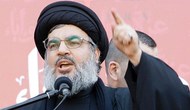
Lebanon's Hezbollah leader Hassan Nasrallah said Palestinians had nothing do to with the latest bombings in southern Beirut.
Nasrallah said leaked reports on the involvement of two Palestinians’ in the latest bombings aim to instigate discord between the Palestinians and the Lebanese.
He spoke out against ongoing attempts to stir animosity against the Palestinian people.
Nasrallah urged Palestinian refugees and activists in Lebanon to keep tabs on the current state of affairs in refugee camps and work on soothing simmering tension.
He said no single Palestinian has been identified among the captives involved in any of the bombings, calling for prosecuting the terrorists.
Nasrallah said leaked reports on the involvement of two Palestinians’ in the latest bombings aim to instigate discord between the Palestinians and the Lebanese.
He spoke out against ongoing attempts to stir animosity against the Palestinian people.
Nasrallah urged Palestinian refugees and activists in Lebanon to keep tabs on the current state of affairs in refugee camps and work on soothing simmering tension.
He said no single Palestinian has been identified among the captives involved in any of the bombings, calling for prosecuting the terrorists.
2 oct 2015
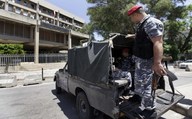
Information Division of the Lebanese Internal Security Forces arrested 40 Palestinian Syrian refugees including women and children on Wednesday.
A report issued by Action Group for Palestinians of Syria revealed that the Lebanese security forces arrested 40 Palestinian Syrians while trying to leave the port city of Tripoli by sea through a boat illegally to Turkey and then to European countries.
In a telephone interview, Dr. Mahmoud Hanafi, head of the Palestinian human rights institution "Shahid," confirmed to the AGPS correspondent in Lebanon that the institution is following the situation of Palestinian refugee detainees closely.
He said: "The Lebanese authorities promised not to hand over anyone of them to the Syrian authorities, adding that the Lebanese General Security in such cases needs to take legal procedures to know the details of the case and access to the smuggler who arranged the trip.
He noted that the detainees will be released immediately upon completion of those procedures, which lasts between two to three days.
It is noteworthy that the Palestinians of Syria in Lebanon suffer miserable living and legal conditions in Lebanon, pushing them to find ways to escape after fleeing from the ravages of the Syrian war, as they are about 45,000 refugees.
A report issued by Action Group for Palestinians of Syria revealed that the Lebanese security forces arrested 40 Palestinian Syrians while trying to leave the port city of Tripoli by sea through a boat illegally to Turkey and then to European countries.
In a telephone interview, Dr. Mahmoud Hanafi, head of the Palestinian human rights institution "Shahid," confirmed to the AGPS correspondent in Lebanon that the institution is following the situation of Palestinian refugee detainees closely.
He said: "The Lebanese authorities promised not to hand over anyone of them to the Syrian authorities, adding that the Lebanese General Security in such cases needs to take legal procedures to know the details of the case and access to the smuggler who arranged the trip.
He noted that the detainees will be released immediately upon completion of those procedures, which lasts between two to three days.
It is noteworthy that the Palestinians of Syria in Lebanon suffer miserable living and legal conditions in Lebanon, pushing them to find ways to escape after fleeing from the ravages of the Syrian war, as they are about 45,000 refugees.
23 aug 2015
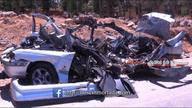
Kuwaiti Al-Rai reports that Hezbollah fears Israel is attempting an escalation as Jerusalem believes "that its situation is critical and will soon be tested"; this follows IDF response attack eliminating Islamic Jihad cell that launched rockets at the Galilee and the Golan Heights.
Kuwaiti newspaper Al-Rai reported Saturday, that Hezbollah has increased its general alert level along the border with Israel, "for fear of attempts by Israel to drag Lebanon and Syria into an escalation of a state less than war but more than an operation."
Officials who spoke with the newspaper said that the Lebanese terrorist organization believes that Israel is getting ready for some sort of action, because the leadership in Jerusalem believes "that its situation is critical and will soon be tested" in view of the recent signing of the nuclear deal with Iran.
Hezbollah, the report added, raised its alert level to the highest possible in order to deal with a war scenario, similar to the Second Lebanon War, while taking into account that things could escalate into an outburst of a wider war.
Saturday night, UN Secretary General Ban Ki-moon expressed "deep concern concerning flagrant violations of the disengagement agreement between Israel and Syria." In response to the rocket fire on the Galilee and the IDF's response attack, Ban's office said: "The UN Secretary General condemns all violations and calls on both parties to refrain from actions that endanger the cease-fire between Israel and Syria and undermine stability in the region." He added that "the parties must show maximum restraint to prevent an escalation."
The tension on the northern border is at its highest since the firing of four rockets on Wednesday at the Golan and Galilee, the first shooting from Syria at the Galilee since the Yom Kippur War in 1973. The IDF announced Friday morning that it killed the terrorist cell which launched the rockets at Israel. At least four people were killed in that attack.
Even before that attack Israel responded by bombing Syrian targets. Syria's news agency quoted a military official who reported that a Syrian army soldier was killed in the bombing by the Israeli Air Force (IAF). The IAFand armored units and artillery attacked 14 Syrian regime targets in the center of the Syria's Golan Heights, the most extensive IDF attack in Syria in recent years.
Friday Arab media published the first photographs documenting the alleged vehicle of the rocket launchers bombed by the IDF in Syria. The Al Mayadeen television network, affiliated with Hezbollah, reported that three of those killed were Palestinians and one Syrian.
A senior IDF officer said the attack was carried out by aircraft. "We followed the cell and it was attacked at a distance of 10 to 15 kilometers from the border , in an area in the total control of the Syrian army," said the military source. He estimated that it was an "Islamic Jihad cell controlled by Iran."
Kuwaiti newspaper Al-Rai reported Saturday, that Hezbollah has increased its general alert level along the border with Israel, "for fear of attempts by Israel to drag Lebanon and Syria into an escalation of a state less than war but more than an operation."
Officials who spoke with the newspaper said that the Lebanese terrorist organization believes that Israel is getting ready for some sort of action, because the leadership in Jerusalem believes "that its situation is critical and will soon be tested" in view of the recent signing of the nuclear deal with Iran.
Hezbollah, the report added, raised its alert level to the highest possible in order to deal with a war scenario, similar to the Second Lebanon War, while taking into account that things could escalate into an outburst of a wider war.
Saturday night, UN Secretary General Ban Ki-moon expressed "deep concern concerning flagrant violations of the disengagement agreement between Israel and Syria." In response to the rocket fire on the Galilee and the IDF's response attack, Ban's office said: "The UN Secretary General condemns all violations and calls on both parties to refrain from actions that endanger the cease-fire between Israel and Syria and undermine stability in the region." He added that "the parties must show maximum restraint to prevent an escalation."
The tension on the northern border is at its highest since the firing of four rockets on Wednesday at the Golan and Galilee, the first shooting from Syria at the Galilee since the Yom Kippur War in 1973. The IDF announced Friday morning that it killed the terrorist cell which launched the rockets at Israel. At least four people were killed in that attack.
Even before that attack Israel responded by bombing Syrian targets. Syria's news agency quoted a military official who reported that a Syrian army soldier was killed in the bombing by the Israeli Air Force (IAF). The IAFand armored units and artillery attacked 14 Syrian regime targets in the center of the Syria's Golan Heights, the most extensive IDF attack in Syria in recent years.
Friday Arab media published the first photographs documenting the alleged vehicle of the rocket launchers bombed by the IDF in Syria. The Al Mayadeen television network, affiliated with Hezbollah, reported that three of those killed were Palestinians and one Syrian.
A senior IDF officer said the attack was carried out by aircraft. "We followed the cell and it was attacked at a distance of 10 to 15 kilometers from the border , in an area in the total control of the Syrian army," said the military source. He estimated that it was an "Islamic Jihad cell controlled by Iran."
29 july 2015
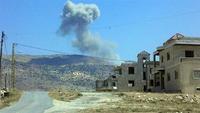
A blast targets the outskirts of the Lebanese border town of Koussaya, July 29, 2015
At least six people have been injured after an Israeli drone attacked the base of a Palestinian group in east Lebanon.
An unmanned aerial vehicle (UAV) belonging to Israeli military targeted the base belonging to the Popular Front for the Liberation of Palestine-General Command (PFLP-GC) near the Lebanese border with Syria on Wednesday, the Lebanese newspaper the Daily Star reported.
Abu Imad Ramez Mustafa, the PFLP-GC’s spokesperson in Lebanon, confirmed that the Israeli drone targeted the group's base in the Zahle district of the border town of Qousaya.
Mustafa also described the Israeli regime as the avowed enemy of the group.
“It was simply because they are one of our primary enemies.”
The Wednesday's strike caused a large blast, stirring panic among the residents.
Also in August 2013, an Israeli warplanes bombed a PFLP-GC base south of the Lebanese capital Beirut.
Earlier on Wednesday, an Israeli drone strike reportedly killed at least two members of the Syrian Armed Forces in Syria’s strategic southwestern province of Quneitra, located on the Syrian side of the Golan Heights, according to Lebanon's al-Manar TV.
However, the so-called Syrian Observatory for Human Rights said an Israeli plane had hit a car, killing two men from the Lebanese resistance movement Hezbollah, and three men from pro-government popular committees in the Druze town.
At least six people have been injured after an Israeli drone attacked the base of a Palestinian group in east Lebanon.
An unmanned aerial vehicle (UAV) belonging to Israeli military targeted the base belonging to the Popular Front for the Liberation of Palestine-General Command (PFLP-GC) near the Lebanese border with Syria on Wednesday, the Lebanese newspaper the Daily Star reported.
Abu Imad Ramez Mustafa, the PFLP-GC’s spokesperson in Lebanon, confirmed that the Israeli drone targeted the group's base in the Zahle district of the border town of Qousaya.
Mustafa also described the Israeli regime as the avowed enemy of the group.
“It was simply because they are one of our primary enemies.”
The Wednesday's strike caused a large blast, stirring panic among the residents.
Also in August 2013, an Israeli warplanes bombed a PFLP-GC base south of the Lebanese capital Beirut.
Earlier on Wednesday, an Israeli drone strike reportedly killed at least two members of the Syrian Armed Forces in Syria’s strategic southwestern province of Quneitra, located on the Syrian side of the Golan Heights, according to Lebanon's al-Manar TV.
However, the so-called Syrian Observatory for Human Rights said an Israeli plane had hit a car, killing two men from the Lebanese resistance movement Hezbollah, and three men from pro-government popular committees in the Druze town.
28 july 2015

Muslim clerics and Palestinian activists from across the world are attending an international conference in Beirut, Lebanon, to support the Palestinian cause and the oppressed nation’s resistance in the face of Israeli occupation and aggression.
Speaking in the inauguration ceremony on Tuesday, the imam of al-Quds Mosque in the southern Lebanese city of Sidon, Sheikh Maher Hamoud, lauded Palestinian factions for their struggles to counter the Israeli regime’s acts of aggression.
“We are proud of being individuals confronting a cancerous tumor (Israel) in the Muslim world,” said the senior cleric.
Hamoud added that the time has come to speak frankly and fearlessly against Israel instead of standing idly and watching the Tel Aviv regime demolish the al-Aqsa Mosque in the occupied Old City of al-Quds (Jerusalem).
“Should we wait for our sons in Palestine to suffer harm more than what they experience nowadays, for al-Aqsa Mosque to be restricted more or for Syrians and Yemenis to be killed more? When will the time come for us to raise our voices in unison against oppression?” asked the top religious figure.
He said the main objective of the ongoing conference on Palestine in Beirut should be the annihilation of Israel, something which will eventually happen as cited by the holy Quran and various rabbis and Israeli officials.
Hamoud further said that the Tel Aviv regime has expressed deep concerns over the Palestinian birth rate. Palestinians will at last subsequently outnumber Israelis, change the demographic features of occupied lands in their favor, and obliterate Israel, the cleric said.
The senior Lebanese clergyman said “Israel will disappear as salt solves in water.”
The Tel Aviv regime has tried to change the demographic makeup of al-Quds over the past decades by constructing illegal settlements, destroying historical sites and expelling the local Palestinian population.
The al-Aqsa Mosque compound is a flashpoint Islamic site, also holy to the Jews. The mosque is Islam’s third holiest site after Masjid al-Haram in Mecca and Masjid al-Nabawi in Medina.
Speaking in the inauguration ceremony on Tuesday, the imam of al-Quds Mosque in the southern Lebanese city of Sidon, Sheikh Maher Hamoud, lauded Palestinian factions for their struggles to counter the Israeli regime’s acts of aggression.
“We are proud of being individuals confronting a cancerous tumor (Israel) in the Muslim world,” said the senior cleric.
Hamoud added that the time has come to speak frankly and fearlessly against Israel instead of standing idly and watching the Tel Aviv regime demolish the al-Aqsa Mosque in the occupied Old City of al-Quds (Jerusalem).
“Should we wait for our sons in Palestine to suffer harm more than what they experience nowadays, for al-Aqsa Mosque to be restricted more or for Syrians and Yemenis to be killed more? When will the time come for us to raise our voices in unison against oppression?” asked the top religious figure.
He said the main objective of the ongoing conference on Palestine in Beirut should be the annihilation of Israel, something which will eventually happen as cited by the holy Quran and various rabbis and Israeli officials.
Hamoud further said that the Tel Aviv regime has expressed deep concerns over the Palestinian birth rate. Palestinians will at last subsequently outnumber Israelis, change the demographic features of occupied lands in their favor, and obliterate Israel, the cleric said.
The senior Lebanese clergyman said “Israel will disappear as salt solves in water.”
The Tel Aviv regime has tried to change the demographic makeup of al-Quds over the past decades by constructing illegal settlements, destroying historical sites and expelling the local Palestinian population.
The al-Aqsa Mosque compound is a flashpoint Islamic site, also holy to the Jews. The mosque is Islam’s third holiest site after Masjid al-Haram in Mecca and Masjid al-Nabawi in Medina.
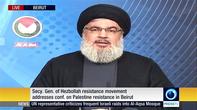
Seyyed Hassan Nasrallah, the secretary general of Lebanese resistance movement Hezbollah, says the issue of Palestine and the Palestinian cause is above politics and political interests.
“Palestine is the responsibility of the Palestinian people,” he said, emphasizing, however, that, “Our responsibility is to support the Palestinian people.”
He called upon scholars worldwide to take up the message of the move by Imam Khomeini, the late founder of the Islamic Republic, to designate the last Friday of the Muslim month of Ramadan as the International Quds Day.
Nasrallah made the remarks on Tuesday at an international conference on Palestine held in the Lebanese capital, Beirut.
He said among the greatest achievements made by the resistance front has been the liberation of Gaza from Israeli occupation, and the “heroic steadfastness” against Israeli wars.
Nasrallah said the “resistance project,” which is confronting the “Zionist project,” should take a close look and study the potential gains by the enemy in an attempt to make up for the damage done by the enemy and end or limit such gains by the opposite front.
What is really sad, he said, is that the issue of Palestine has been sidelined as “the world looks elsewhere.”
“That doesn’t mean that the project of resistance has weakened,” the Hezbollah secretary general said, adding that the strong elements of resistance must also be studied.
“We should also re-evaluate who supports us,” he said, adding that the resistance front should study who still supports it and who “sells it out.”
He said any attempt in the Arab and Islamic world to bring about any form of the normalization of relations with the Israeli regime has to be countered.
He also said the issue of Palestine is in need of a big campaign to remind people of the true nature of the Israeli enemy, “because, it seems, there are some who quickly forget the Israeli terrorism.”
“The Israeli regime is a beast on Palestinian territories,” he said.
“Right now, there are some Arab countries that have taken Israel out of the circle of threats,” he said. “This is something very dangerous.”
Nasrallah further noted that whatever happens in the world, the resistance movement will not give up backing Palestine and pursuing the issue of the liberation of al-Quds (Jerusalem).
The Hezbollah leader also said the resistance movement will cooperate with any Arab and Muslim country on the issue of Palestine.
He also stressed that the Tel Aviv regime is on the verge of collapse and the Israeli occupied territories will be restored to the Palestinians.
“Palestine is the responsibility of the Palestinian people,” he said, emphasizing, however, that, “Our responsibility is to support the Palestinian people.”
He called upon scholars worldwide to take up the message of the move by Imam Khomeini, the late founder of the Islamic Republic, to designate the last Friday of the Muslim month of Ramadan as the International Quds Day.
Nasrallah made the remarks on Tuesday at an international conference on Palestine held in the Lebanese capital, Beirut.
He said among the greatest achievements made by the resistance front has been the liberation of Gaza from Israeli occupation, and the “heroic steadfastness” against Israeli wars.
Nasrallah said the “resistance project,” which is confronting the “Zionist project,” should take a close look and study the potential gains by the enemy in an attempt to make up for the damage done by the enemy and end or limit such gains by the opposite front.
What is really sad, he said, is that the issue of Palestine has been sidelined as “the world looks elsewhere.”
“That doesn’t mean that the project of resistance has weakened,” the Hezbollah secretary general said, adding that the strong elements of resistance must also be studied.
“We should also re-evaluate who supports us,” he said, adding that the resistance front should study who still supports it and who “sells it out.”
He said any attempt in the Arab and Islamic world to bring about any form of the normalization of relations with the Israeli regime has to be countered.
He also said the issue of Palestine is in need of a big campaign to remind people of the true nature of the Israeli enemy, “because, it seems, there are some who quickly forget the Israeli terrorism.”
“The Israeli regime is a beast on Palestinian territories,” he said.
“Right now, there are some Arab countries that have taken Israel out of the circle of threats,” he said. “This is something very dangerous.”
Nasrallah further noted that whatever happens in the world, the resistance movement will not give up backing Palestine and pursuing the issue of the liberation of al-Quds (Jerusalem).
The Hezbollah leader also said the resistance movement will cooperate with any Arab and Muslim country on the issue of Palestine.
He also stressed that the Tel Aviv regime is on the verge of collapse and the Israeli occupied territories will be restored to the Palestinians.
22 july 2015
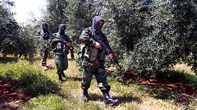
American Treasury Department targets senior military commanders, Lebanese businessman involved in Hezbollah's fighting in Syria.
The US Treasury Department on Tuesday imposed sanctions on three leaders of the militant group Hezbollah and a businessman in Lebanon, saying they were key players in the group's military operations in Syria.
"The United States will continue to aggressively target (Hezbollah) for its terrorist activities worldwide as well as its ongoing support to (Syrian President Bashar) Assad's ruthless military campaign in Syria," said Adam Szubin, the Treasury Department's acting under secretary for terrorism and financial intelligence.
US President Barack Obama and Secretary of State John Kerry have said they are troubled by support from Iran for regional proxy groups such as Hezbollah. The United States and world powers struck a deal with Iran last week to limit the country's nuclear program in return for relief from sanctions. Obama said last week that the deal would make it easier for the United States to "check Iran's nefarious activities." The Treasury said it had taken action in June against Hezbollah front companies.
Hezbollah has long been designated a terrorist organization by the United States, but Tuesday's action was directed at three senior military officials - Mustafa Badr Al Din, Ibrahim Aqil, and Fu'ad Shukr - for their role in coordinating or participating in the group's support for Assad's government in Syria's ongoing civil war.
A businessman in Lebanon, Abd Al Nur Shalan, was also sanctioned for procuring weapons for Hezbollah and shipping them to Syria, the Treasury Department said.
The US Treasury Department on Tuesday imposed sanctions on three leaders of the militant group Hezbollah and a businessman in Lebanon, saying they were key players in the group's military operations in Syria.
"The United States will continue to aggressively target (Hezbollah) for its terrorist activities worldwide as well as its ongoing support to (Syrian President Bashar) Assad's ruthless military campaign in Syria," said Adam Szubin, the Treasury Department's acting under secretary for terrorism and financial intelligence.
US President Barack Obama and Secretary of State John Kerry have said they are troubled by support from Iran for regional proxy groups such as Hezbollah. The United States and world powers struck a deal with Iran last week to limit the country's nuclear program in return for relief from sanctions. Obama said last week that the deal would make it easier for the United States to "check Iran's nefarious activities." The Treasury said it had taken action in June against Hezbollah front companies.
Hezbollah has long been designated a terrorist organization by the United States, but Tuesday's action was directed at three senior military officials - Mustafa Badr Al Din, Ibrahim Aqil, and Fu'ad Shukr - for their role in coordinating or participating in the group's support for Assad's government in Syria's ongoing civil war.
A businessman in Lebanon, Abd Al Nur Shalan, was also sanctioned for procuring weapons for Hezbollah and shipping them to Syria, the Treasury Department said.
11 july 2015
|
|
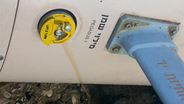
Lebanon Army posts photos of alleged UAV, which it says belongs to 'the Israeli enemy'; IDF declines comment on reports.
The Lebanese army said an Israeli drone crashed into the sea off the port of the northern coastal city of Tripoli on Saturday. The IDF declined comment on the reports. "Around 8:30 am, a drone that belongs to the Israeli enemy crashed at Tripoli port," the Lebanese army said in a statement. Lebanese media reported the army closed off the area and pulled the aircraft out of the water. After examining the drone, the reports said, "it turned out this was an Israeli drone." The Lebanese army also posted photos of the aircraft in its official Twitter page. Three weeks ago, Lebanese security forces claimed an aircraft that crashed in the Bekaa region belonged to Israel. A security source in Lebanon told Hezbollah's Al-Manar TV channel that the drone crashed overnight and that an Israeli airstrike on Sunday morning blew up the drone to ensure it is destroyed. Earlier, Al Jazeera reported that Israeli attacked in the area. However, there has been no official confirmation that the drone was indeed |
Israeli, and it is believed it was actually a Syrian drone shot down by the rebels.
Ten months ago, an Israeli drone crashed in southern Lebanon. The IDF said the crash happened due to technical issues during routine operations along the border.
Another Israeli drone crashes in Lebanon
An Israeli reconnaissance drone has gone down in northern Lebanon after it penetrated into the country’s airspace and flew over parts of the Arab state in a flagrant violation of a UN Security Council resolution.
The unmanned aerial vehicle (UAV) crossed into Lebanon’s airspace early on Saturday and carried out surveillance flights before crashing into waters off the coast of the port city of Tripoli at around 8:30 a.m. local time (0530 GMT), according to a statement issued by the Lebanese military.
A security official, speaking on condition of anonymity, said the army retrieved the aircraft from eight meters (26 feet) under water.
The Israeli military has not yet made any comments on the incident.
On June 21, an Israeli fighter jet struck a mountainous area near the town of Saghbine in Lebanon’s Bekaa Valley, located about 70 kilometers (44 miles) east of the capital, to destroy the wreckage of an Israeli spy drone that had earlier crashed in the area.
Video footage broadcast by Lebanon-based and Arabic-language al-Manar satellite television network showed the remains of the Israeli aircraft, including what looked to be a wing and twisted pieces of metal.
Israel violates Lebanon’s airspace on an almost daily basis, claiming the flights serve surveillance purposes.
Lebanon’s government, the Hezbollah resistance movement, and the UN Interim Force in Lebanon, UNIFIL, have repeatedly condemned the overflights, saying they are in clear violation of UN Resolution 1701 and the country’s sovereignty.
UN Security Council Resolution 1701, which brokered a ceasefire in the war of aggression Israel launched against Lebanon in 2006, calls on Israel to respect Lebanon's sovereignty and territorial integrity.
Ten months ago, an Israeli drone crashed in southern Lebanon. The IDF said the crash happened due to technical issues during routine operations along the border.
Another Israeli drone crashes in Lebanon
An Israeli reconnaissance drone has gone down in northern Lebanon after it penetrated into the country’s airspace and flew over parts of the Arab state in a flagrant violation of a UN Security Council resolution.
The unmanned aerial vehicle (UAV) crossed into Lebanon’s airspace early on Saturday and carried out surveillance flights before crashing into waters off the coast of the port city of Tripoli at around 8:30 a.m. local time (0530 GMT), according to a statement issued by the Lebanese military.
A security official, speaking on condition of anonymity, said the army retrieved the aircraft from eight meters (26 feet) under water.
The Israeli military has not yet made any comments on the incident.
On June 21, an Israeli fighter jet struck a mountainous area near the town of Saghbine in Lebanon’s Bekaa Valley, located about 70 kilometers (44 miles) east of the capital, to destroy the wreckage of an Israeli spy drone that had earlier crashed in the area.
Video footage broadcast by Lebanon-based and Arabic-language al-Manar satellite television network showed the remains of the Israeli aircraft, including what looked to be a wing and twisted pieces of metal.
Israel violates Lebanon’s airspace on an almost daily basis, claiming the flights serve surveillance purposes.
Lebanon’s government, the Hezbollah resistance movement, and the UN Interim Force in Lebanon, UNIFIL, have repeatedly condemned the overflights, saying they are in clear violation of UN Resolution 1701 and the country’s sovereignty.
UN Security Council Resolution 1701, which brokered a ceasefire in the war of aggression Israel launched against Lebanon in 2006, calls on Israel to respect Lebanon's sovereignty and territorial integrity.
